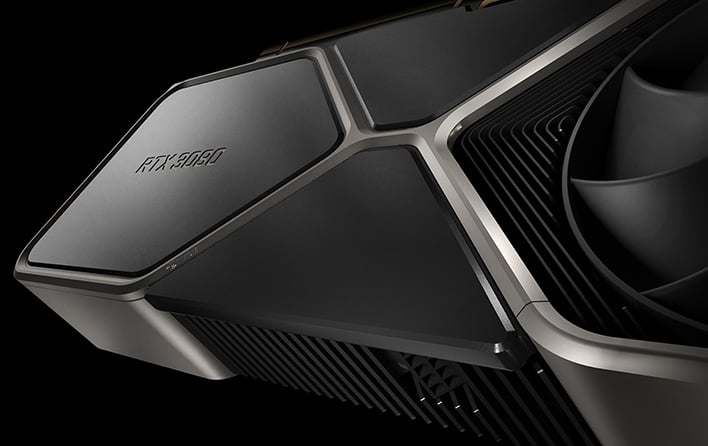GeForce RTX 3080 Lays Smackdown On RTX 2080 Ti In CompuBench Showdown

NVIDIA is giving its GeForce RTX 3080 top billing as this generation's flagship graphics card for gaming, a designation that could also be applied to the monstrous GeForce RTX 3090, except that part is basically the newest iteration of the Titan RTX (only not named as such). Can the GeForce RTX 3080 handle the flagship spotlight? Some early benchmarks suggest it can, and with aplomb.
We will post our own hands-on analysis with benchmarks and observations as soon as possible. In the meantime, we are left to look at two things—NVIDIA's own performance claims, and leaked benchmarks. Speaking to the latter, NVIDIA claims the GeForce RTX 3070 is faster than the GeForce RTX 2080 Ti, and that the GeForce RTX 3080 is twice as fast at the GeForce RTX 2080.
Is that really the case? As spotted by Twitter user APISAK, the GeForce RTX 3080 has made an appearance in CompuBench's database, and going by those numbers alone, it is indeed a fast card.
There are two separate comparison pages that you can view (GeForce RTX 3080 versus GeForce RTX 2080, and GeForce RTX 3080 versus GeForce RTX 2080 Ti). However, to make things more easily digestible at a glance, I've spliced together the results comparing all three cards (you can also do that on the site if you register and log in). Have a look...
Looking at the results, we can see the GeForce RTX 3080 living up to NVIDIA's claims of offering twice the performance of the GeForce RTX 2080 in some of the individual tests. That's not the case across the board, but it did post a higher score in every category. And in the Vertex Connection and Merging test, it posted 39.042 mPixels/s, which is more than twice the 18.555 mPixels/s posted by the GeForce RTX 2080.
Just as impressive, the GeForce RTX 3080 dusted the GeForce RTX 2080 Ti in every single test. These are not small victories, either. In the Ocean Surface Simulation test, the GeForce RTX 3080 scored more than 37 percent higher. The GeForce RTX 3080's largest margin of victory came in the Catmull-Clark Subdivision Level 5 test, where it scored more than 60 percent higher than the GeForce RTX 2080 Ti.
These are impressive gains. Bear in mind that we are talking about a $699 graphics card wiping the floor with a part that debuted at $999 (or $1,199 for the Founders Edition). We don't want to extrapolate too much from leaked benchmarks, but these numbers suggest a significant generational leap in performance, at a much lower price.
Optimized drivers could widen the gap even further. We'll have to wait and see how it all actually turns out, but so far, NVIDIA's new Ampere cards are off to a solid start.


